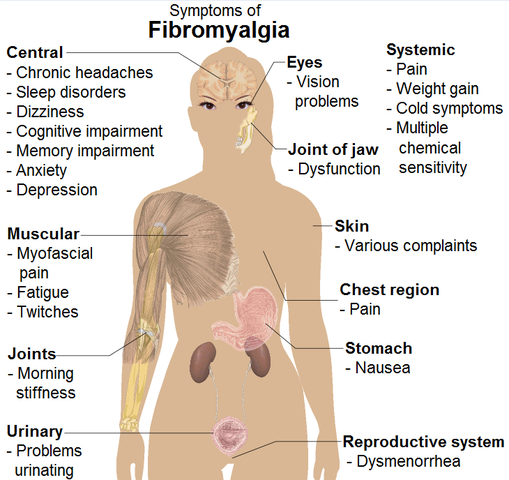Chronic Pain
Is Fibromyalgia Due to a Mineral Deficiency?
Using supplemental magnesium to treat fibromyalgia symptoms
Posted September 11, 2012

Many thousands of people, mostly women, suffer from fibromyalgia. It’s a poorly understood disorder to some extent and can be quite debilitating. Musculoskeletal pain and fatigue (along with poor sleep) are the primary symptoms, but those afflicted are more likely to have depression and anxiety symptoms as well. There are no definitive biomarkers and no X-ray findings, and the correlation with depression and anxiety leads to some doctors and lay people thinking that fibromyalgia is “all in the head.”
I tend to wonder if conditions like fibromyalgia are related to immune dysfunction and inflammation. After all, often the first symptom when you catch a virus is a horrible aching and fatigue. The virus is not typically the agent causing the symptoms—often it is your immune response to it. I also tend to think that we modern humans, given our chronic stress and suboptimal diets, might be somewhat micronutrient deficient, particularly among the minerals. Magnesium is one mineral that we likely don’t get enough of, partly because major historical sources were organ meats and mineral water, and partly because our agricultural soils may be somewhat depleted of minerals. Since sufficient magnesium is necessary to regulate our stress response, it would make sense that a chronic, low-level insufficiency of magnesium could lead to all sorts of chronic problems.

Not too long ago I found this study on Pubmed:
It's a small study, 60 women with fibromyalgia. Nothing definitive but certainly very interesting.
My guess is that fibromyalgia is a variant of depressive disorders that is mediated by a poorly regulated stress response combined with broken sleep, oxidative stress, and inflammation. There's very likely a gut microflora connection. I can further speculate that a program of stress reduction, a nutrient-rich, diet, sensible exercise and good sleep hygiene would go a long way to help a large percentage of those with fibromyalgia. Certainly those interventions are unlikely to cause harm, even if they don’t help everyone.
The diagnosis of fibromyalgia has become more popular recently because there are several shiny new drugs FDA-approved to treat it, such as duloxetine, pregabalin, and milnacipram. As a psychiatrist I have the most experience clinically with duloxetine, which is also FDA-approved for major depressive disorder. Duloxetine is one of the class of second generation mixed norepinephrine and serotonin-reuptake inhibitors. And I would have to say, in my clinic, it really does seem to help the annoying, constant aches of fibromyalgia in many. Duloxetine can also cause weight gain, sedation and a host of other irritating antidepressant side effects, and it is expensive. The other pharmaceuticals commonly used are the old-fashioned (and very inexpensive) tricyclic antidepressants (TCAs). There is quite a bit of data for these older medications, but they are also fatal in overdose and cause much more weight gain, sedation, and deal-breaking dry mouth than the next generation medication duloxetine.
But what if there were an even cheaper, easier, less side-effect laden pill or supplement to take for fibromyalgia? How about magnesium? As I mentioned earlier, magnesium deficiency can cause us to be more vulnerable to a poorly regulated stress response, and magnesium is absolutely necessary to metabolize energy efficiently. Since most magnesium is stored within cells and bones, a simple serum level generally won't tell us much. Since we die rather quickly of heart problems if our blood levels are low, our regulatory systems pull out all the stops to make sure our blood levels remain within a certain range, even if our bodies are relatively deficient.
Back to the study. These researchers took 60 women with fibromyalgia and 20 controls. The patients were randomized into three groups, magnesium citrate 300mg daily, amitriptyline 10mg daily (a TCA), or Magnesium Citrate + amitriptyline for eight weeks. Number of tender points (a measure of fibromyalgia severity) and a "tender point index" were assessed. Serum and red blood cell levels of magnesium were measured and followed. In addition, all the participants took standard scale questionnaires measuring depression, anxiety, and fibromyalgia symptoms. All of these measures were taken before and after treatment.
Why magnesium? The researchers were intrigued by the idea of fibromyalgia being a disease of oxidative stress, and mineral deficiencies are known to predispose folks to oxidative stress. Magnesium plays a critical role in the various processed turning the food we eat and our fuel stores into energy used by the cells. It was postulated that muscle cells could be low in magnesium while the blood levels were maintained with normal limits (to preserve the heart), and this low magnesium could cause problems with muscle cells turning fuel into energy, thus fatigue, weakness, and pain. A previous study showed that 300-600 mg of magnesium malate daily improved the symptoms of fibromyalgia (1). Another trial used a mix of magnesium supplements (low and high) with similar results to the previous study in the high-dose arm (2).
In the brand new study, here are the results:
...magnesium levels [both serum and red blood cell] were lower [in fibromyalgia patients] than in the control groups and there was a correlation between magnesium and VAS, the number of tender points, tender point index, the FIQ, the Beck depression and anxiety score and clinical symptoms such as fatigue, sleep disorder, headache, numbness and gastric disorders. All of these findings support the fact that magnesium plays an important role in the development of fibromyalgia.
That's pretty impressive. Here, then, appears to be the third trial showing clinical improvement with magnesium supplementation for fibromyalgia. The patients who did best were on a combination of magnesium and amitriptyline (the 10mg dose is quite low and would not expect to have much in the way of antidepressant effects).
Before we get too terribly excited, there are studies showing that sleeping medicines alone will help improve symptoms of fibromyalgia, and one of the most consistent reports of people taking magnesium is that sleep is improved. Similarly, amitriptyline in a 10 or 25 mg dose is often used off-label as a prescription sleep aid. That might explain the improvement all on its own.
But however the magnesium seems to help, that it does could be significant for many. It certainly seems worth a try, considering the risks and benefits and costs of the FDA approved treatments (pregabalin, duloxetine, and milnacipram) and the multitude of benefits from getting one's magnesium levels up to snuff. These are not massive doses. Considering the average diet gives us maybe 250mg daily, adding 300mg daily puts us just a little above the RDA. If you have healthy kidneys, this amount of magnesium supplementation is generally quite safe.
Image Credit
Copyright Emily Deans, MD




